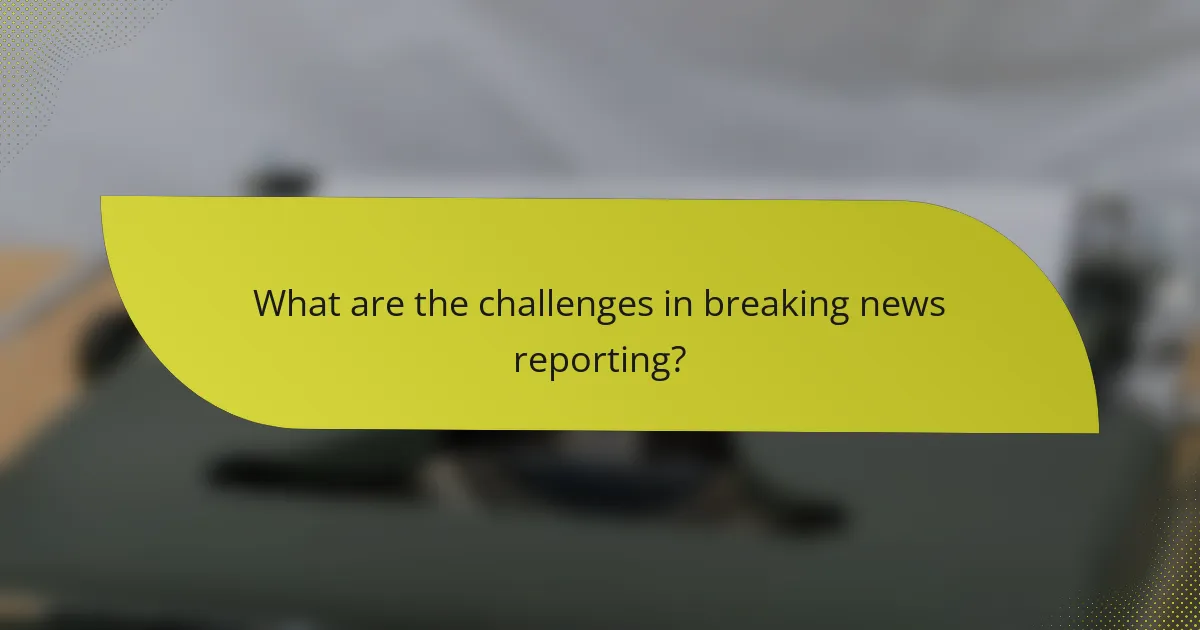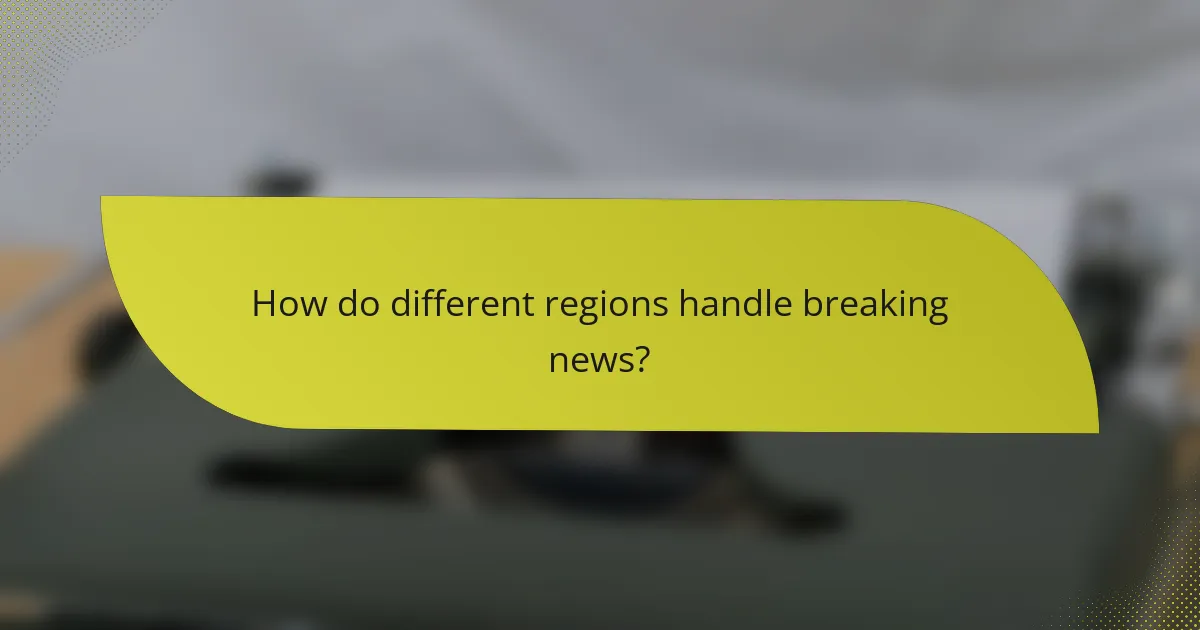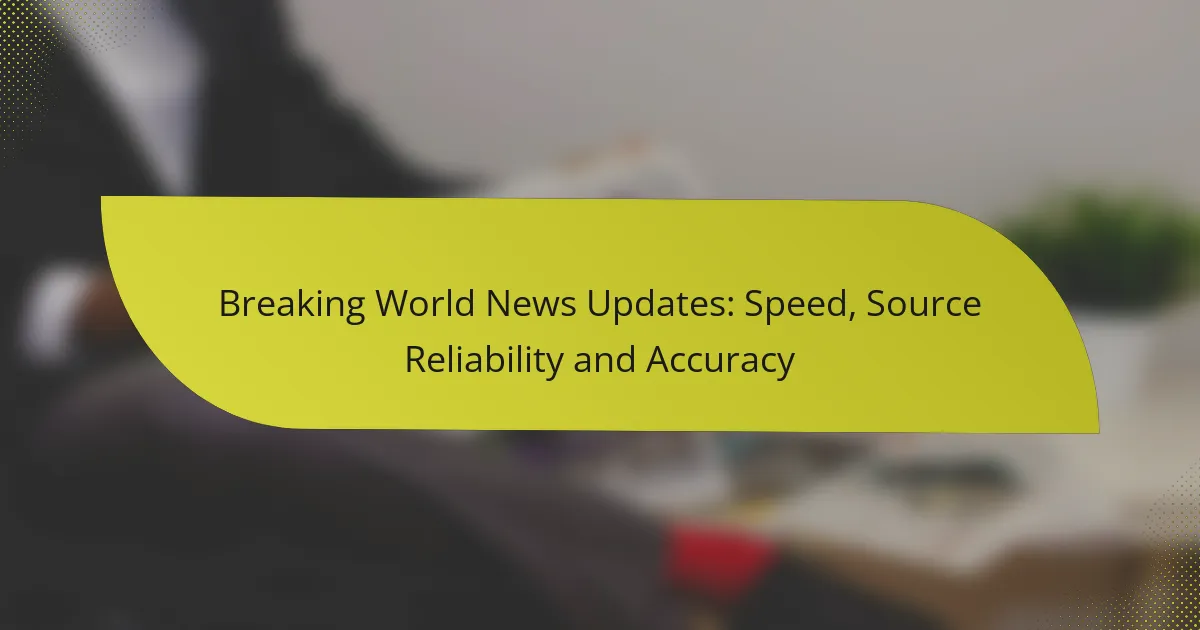Staying updated with breaking world news requires quick access to real-time alerts and reliable sources. Utilizing social media and news aggregator apps can help you receive timely information from established organizations committed to accuracy. To ensure the credibility of the news, it’s essential to verify details through trusted channels and fact-checking methods.

How to get breaking world news updates quickly?
To receive breaking world news updates quickly, utilize real-time news alerts, social media platforms, and news aggregator applications. These tools provide timely information from reliable sources, ensuring you stay informed as events unfold.
Real-time news alerts from Reuters
Reuters offers real-time news alerts that deliver breaking news directly to your device. You can subscribe to their notifications via email or mobile app, ensuring you receive updates within seconds of major events.
Consider customizing your alert preferences to focus on specific topics or regions that interest you. This way, you can filter out noise and receive only the most relevant information.
Social media updates from Twitter
Twitter is a powerful platform for real-time news updates, as many news organizations and journalists share breaking news as it happens. Following credible news accounts can provide you with instant updates and diverse perspectives on global events.
To enhance your experience, create lists of trusted news sources or use hashtags related to current events. This allows you to quickly access the latest information without sifting through unrelated content.
News aggregator apps like Flipboard
News aggregator apps, such as Flipboard, compile articles from various sources into a single feed, making it easy to access breaking news. These apps allow you to personalize your news experience by selecting topics of interest and following specific publications.
Utilize the app’s features to save articles for later reading or share them with others. Regularly updating your preferences can help ensure you receive the most relevant and timely news updates.

Which sources provide reliable breaking news?
Reliable breaking news sources are essential for accurate and timely information. Key players include established news organizations known for their commitment to fact-checking and real-time reporting.
BBC News for global coverage
BBC News is renowned for its extensive global coverage, providing updates from around the world. Its correspondents are stationed in various countries, allowing for a diverse perspective on international events.
When seeking breaking news, consider BBC News for its comprehensive reports that often include context and analysis. This can help you understand the implications of events as they unfold.
Associated Press for fact-checked reports
The Associated Press (AP) is a trusted source for fact-checked news, known for its rigorous standards in journalism. AP’s reports are often used by other news outlets, ensuring a high level of reliability.
For breaking news, the AP provides concise updates that focus on verified information. This makes it a go-to source for those who prioritize accuracy over sensationalism.
CNN for live updates
CNN specializes in delivering live updates on breaking news, making it an excellent choice for real-time information. Their coverage often includes live broadcasts and minute-by-minute updates on significant events.
When you need immediate news, CNN’s live reporting can keep you informed as situations develop. However, be mindful of potential biases and cross-reference with other sources for a well-rounded view.

How to assess the accuracy of breaking news?
To assess the accuracy of breaking news, verify information through reliable sources and established fact-checking methods. This process helps ensure that the news you consume is credible and not misleading.
Cross-referencing multiple sources
Cross-referencing multiple sources involves checking the same news story across different reputable outlets. Look for consistency in the details reported, such as key facts, quotes, and context. If several trusted sources report the same information, it increases the likelihood of accuracy.
Be cautious of relying solely on social media or lesser-known websites, as they may not adhere to rigorous journalistic standards. Aim to consult established news organizations that have a history of reliability.
Fact-checking websites like Snopes
Fact-checking websites like Snopes provide thorough investigations into claims made in the news. These platforms assess the validity of information by examining the evidence and sourcing. They often categorize findings as true, false, or misleading, which can help clarify the accuracy of breaking news.
Utilizing these resources can save time and prevent the spread of misinformation. Always check the publication date and context of the fact-check to ensure it pertains to the current news cycle.
Verification tools like ClaimCheck
Verification tools such as ClaimCheck allow users to analyze the authenticity of claims made in news articles. These tools often use algorithms to assess the credibility of sources and the likelihood of information being accurate. They can be particularly useful for quickly evaluating breaking news.
While these tools can enhance your assessment process, they should not replace critical thinking. Always consider the context and the potential biases of the sources being analyzed.

What are the challenges in breaking news reporting?
Breaking news reporting faces several challenges, primarily balancing speed, accuracy, and the risk of misinformation. Journalists must navigate these obstacles to deliver timely and reliable information to the public.
Speed vs. accuracy dilemma
The speed vs. accuracy dilemma is a critical issue in breaking news. Journalists often feel pressured to report information quickly, which can lead to errors if facts are not thoroughly verified. For instance, a story may need to be published within minutes, but taking even a few extra minutes to confirm details can significantly enhance its reliability.
To manage this dilemma, news organizations can implement protocols that prioritize verification without sacrificing timeliness. For example, using trusted sources for initial reports can help ensure that the information shared is more likely to be accurate.
Impact of misinformation
Misinformation can spread rapidly in the digital age, posing a significant challenge to breaking news reporting. Incorrect information can lead to public panic, misinformed decisions, and damage to reputations. The rise of social media has amplified this issue, as unverified news can go viral before it is properly fact-checked.
To combat misinformation, journalists should emphasize source verification and transparency. Providing context and citing reliable sources can help the audience discern credible information from falsehoods. Additionally, engaging with fact-checking organizations can bolster the accuracy of reported news.
Pressure on journalists
Journalists face immense pressure to deliver breaking news quickly, which can lead to stress and burnout. This pressure often comes from both the fast-paced nature of news cycles and the expectations of their audience for immediate updates. The need to be first can overshadow the importance of being right.
To alleviate this pressure, news organizations should foster a culture that values accuracy over speed. Encouraging journalists to take the necessary time to verify information can lead to more trustworthy reporting. Providing mental health support and resources can also help journalists cope with the demands of their roles.

How do different regions handle breaking news?
Regions around the world have distinct approaches to handling breaking news, influenced by cultural norms, regulatory frameworks, and technological capabilities. Understanding these differences can help consumers of news assess the reliability and speed of information they receive.
Breaking news protocols in the US
In the United States, breaking news is typically reported by a wide array of media outlets, including television, radio, and online platforms. News organizations often prioritize speed, sometimes leading to the rapid dissemination of unverified information.
Protocols emphasize the need for accuracy, but the competitive nature of the media landscape can result in premature reporting. Journalists are encouraged to confirm facts before broadcasting, but the pressure to be first can lead to mistakes.
European news reporting standards
European countries generally maintain stricter standards for news reporting, with a focus on accuracy and verification. Many nations have regulatory bodies that oversee media practices, ensuring that news outlets adhere to ethical guidelines.
For example, the BBC in the UK has a reputation for thorough fact-checking and impartial reporting. In contrast, some smaller nations may have less stringent regulations, which can affect the reliability of breaking news.
Asia-Pacific news dissemination methods
The Asia-Pacific region features a diverse landscape of news dissemination methods, influenced by varying levels of press freedom and technological access. In countries like Japan and South Korea, traditional media remains strong, but digital platforms are rapidly gaining ground.
In contrast, nations with tighter government control over media, such as China, may restrict the flow of information, impacting how breaking news is reported. Social media plays a crucial role in these areas, often serving as the primary source of real-time updates, albeit with varying levels of reliability.
